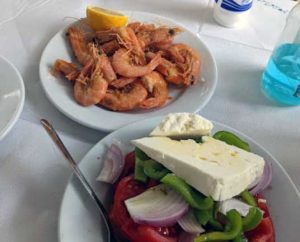Eating real greek food in Athens

The plethora of restaurants in Athens give to the visitor the chance to taste flavours from almost every area of Greece. But many tourist that arriving in Greece have already some knowledge about the food and cuisine in Greece because of the numerous restaurants that have been made by Greeks of the Diaspora all over the world.
It is true that almost in every port around the world you will find a Greek restaurant or a Greek tavern, the kitchen probably changes according the local taste, but still the main dishes have the Greek flavour.
One thing you must get use in Greece is the Olive oil, almost in any food Greeks love to add lots of oil. There is no Greek Salad without olive oil ,onions, Greek tomatoes and feta and there is no Greek souvlaki without tsatsiki and tsatsiki without olive oil! Well this is probably one reason why the Greeks have one of the highest life expectancy in Europe.

Most of the typical red sauces have cloves and cinnamon and when in a Greek house Greek spaghetti ala Bolognese is cooking the house smells like Christmas cookies, because of the cloves and cinnamon, but the end result is really tasteful.
The same combination is on the famous Stifado (meat with onions in red sauce)

Or there is no equivalent to the bugatsa pie that you can eat in Thessaloniki or the traditional Souvlaki on stick that you can eat in Arachova. Every place its famous for its kitchen and sweets. Syros is famous for its Loukoumia (sugar delights) and Andros for its Amygdalota (almond based sweets)
The Cretan cuisine has a lot of specialities but most well known all over Greece are the crisps from Crete (paximadia). The same occurs for the Greek wines like the wines of Santorini , the wines of Crete, the wines of Samos or the Retsina from Mesogeia of Attica.
The typical Greek kitchen might not have the fast food like other countries like hamburgers in the USA, pizza in Italy, bratwurst in Germany or sausage rolls in the UK, but it has the Tytopita (Greek cheese pie) and the Koulouri (the Greek crispy croissant topped with sesame)

Those two where the quick snacks that feed generations of Greeks. Souvlaki, though many refer to it as the Greek hamburger, back in the 50’s was a luxury item, available on Sunday walks and cinema outing and still its war with tyropita and koulouri is somehow equal.
The Greeks love fish a lot. Greece is a nautical country and fishing is one of the main agricultural professions, therefore fish specialities are among the popular dishes of Greece. The fish in Greece is cooked, fried grilled or boiled as the bouillabaisse.
Most common to the Greek household is the fried fish though grilled is recommended in most restaurants. Fishes in Greece are divided in 3 classes A, B, C and according the class so is the price per kilo. So if you order a sea bream or a sword fish its a B class while a lobster is A class and a Mackerel or a whitebait is C class.
